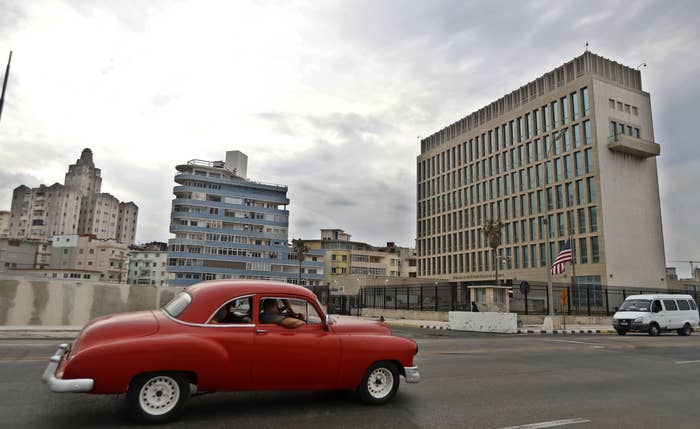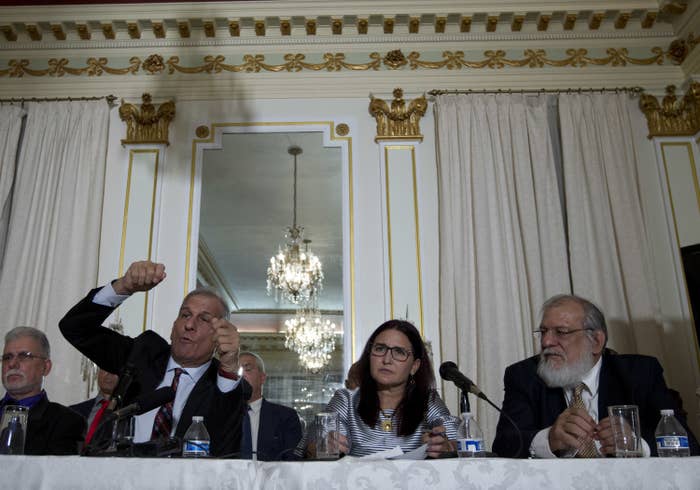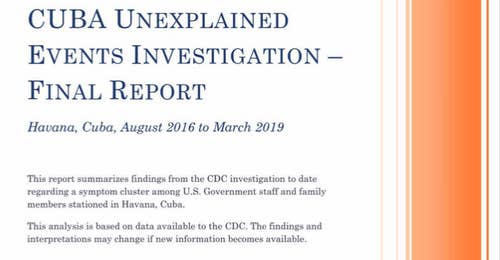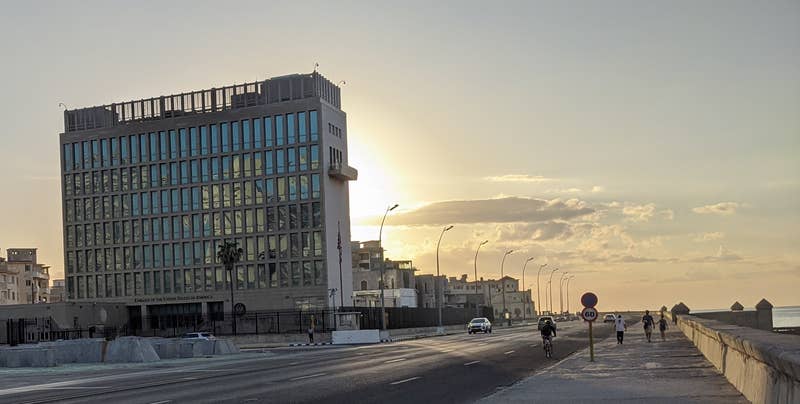The report, which has never been made public, found that mysterious illnesses in diplomats in Cuba could not be explained by their medical histories.
Dan Vergano BuzzFeed News Reporter
Posted on January 15, 2021,

Anadolu Agency / Getty Images The US embassy in Havana
The "Havana syndrome" outbreak of mysterious injuries among US diplomats in Cuba can't be explained by their medical records, according to a 2019 CDC report buried by the agency and obtained by BuzzFeed News.
Starting in December of 2016, dozens of diplomats in Cuba and their families reported puzzling neurological injuries, often marked by buzzing noises followed by pain, vertigo, and difficulty concentrating. Described as a "health attack" by then–secretary of state Rex Tillerson, their symptoms led to a diplomatic rupture between the US and Cuba that has continued to worsen into the final days of the Trump administration.
Speculative news reports blamed mystery “sonic” weapons for the injuries, as well as crickets, pesticides, and mass hysteria. Similar injuries have since been reported among US diplomats in China and Canadian diplomats in Cuba.
In 2018, Congress demanded the CDC investigate the illnesses. The agency’s "Cuba Unexplained Events Investigation" was a first attempt to synthesize all the medical records of 95 US diplomats and family members who were evaluated for these injuries, gathered from the State Department, National Institutes of Health, University of Pennsylvania, and University of Miami doctors who treated them. The report, which was never made public, was obtained by BuzzFeed News via a Freedom of Information Act request.
The CDC report ultimately found that the diplomats’ medical histories alone could not explain their illnesses. Inconsistencies in their records, as well as long times between symptoms and medical tests, "hindered CDC's ability to discriminate patterns in the data," the report concluded.
"Essentially the CDC is saying that they have no idea what happened in Cuba," said UCLA neurologist Robert Baloh, who reviewed the report for BuzzFeed News. "CDC should have been called in at the beginning."

Jose Luis Magana / AP
Members of the Cuban delegation — from left: senior researcher Mitchell Joseph Valdes Sosa, Deputy Director for North America at the Cuban Ministry of Foreign Affairs Johana Tablada, and Pedro Antonio Valdes Sosa — speak during a news conference about the mystery illnesses at the Cuban Embassy in Washington, Sept. 13, 2018.
Investigators found 15 people suffered from a two-stage syndrome — often noises followed by immediate symptoms and then neurological injuries weeks later. Nine of those people reported improvement in their conditions over time, and none reported worsening. Another 31 more were "possible" cases, either lacking neurological symptoms or with an unclear starting point, and 49 were not likely cases.
“The only conclusion that seems clear is that a constellation of neurobehavioral symptoms was experienced among embassy personnel, but the underlying reasons for the symptoms are not known and the pattern of symptoms does not correspond to any known diseases,” said Brown University epidemiologist David Savitz.
Despite initially considering a case–control study comparing the injured people to their healthy counterparts at the embassy to figure out what had happened, the investigators concluded "misleading or obscured findings" could result because of the time elapsed since the symptoms were reported.
“One major obstacle is that people have trouble accurately remembering how things were for them months and especially years earlier,” said psychologist Noah Silverberg of the University of British Columbia, by email. His work on studying head injuries was cited by the CDC in its decision not to pursue a controlled study.
“People seeking medical care for these kinds of symptoms following a concussion often say that they did not have any headaches or difficulty concentrating before their injury, even though healthy (uninjured) people universally experience at least occasional headaches and difficulty concentrating,” said Silverberg. This greatly limited what the CDC could examine so long after the injuries were first reported.

CDC / Via beta.documentcloud.org
Front cover of CDC report
The existence of the completed CDC investigation was only revealed in a December National Academies of Sciences, Engineering, and Medicine report, which concluded that pulsed radiofrequency waves were the “most plausible” explanation for the events. That led to criticism from experts in microwaves who saw no evidence supporting that finding, and those, like Baloh, who suggest mass psychology better explains the symptoms.
Although the CDC’s investigation was demanded by US lawmakers, and its conclusion says, “CDC is working with partners to disseminate findings from this investigation to the medical community and the public,” the report was only made available in redacted form, with some pages obscured under medical privacy claims. However, the December NASEM report on the illnesses cites some of the redacted CDC findings, including that 6 of the 15 people injured were still in rehabilitative therapy and 4 are still unable to work two years later.
The CDC declined to comment on the report or explain why it ultimately withheld the findings from the public.

BuzzFeed News / Dan Vergano
The US embassy in Havana
The report does clarify the exact sequence of events in Havana, reporting that only one person from the embassy, in late December of 2016, reported neurological symptoms such as dizziness and headaches after hearing noises. A second individual cited similar injuries in February of 2017, spurring the embassy to ask the rest of the personnel there whether they had experienced such symptoms, with some reporting similar experiences predating the first case. Experts in mass psychology have suggested the embassy primed the group to experience the symptoms after those first two reports, possibly triggering subsequent real injuries driven by group psychology.
Whatever the cause, “It is simply impossible to overcome the inherent limitations in the data,” said Savitz.
“Given the conspiracy era we're in, it is probably worth noting that the lack of a definitive answer is not some conspiracy of silence or effort by the State Department to hide something,” he added. “We simply do not know what caused the phenomenon, and it is not the case that it's known, or obvious, and is being suppressed.”
MORE ON THIS
Scientists Are Slamming A Report Saying Microwave Attacks Could Have Caused “Havana Syndrome” In US Diplomats Dan Vergano · Dec. 8, 2020
Posted on January 15, 2021,

Anadolu Agency / Getty Images The US embassy in Havana
The "Havana syndrome" outbreak of mysterious injuries among US diplomats in Cuba can't be explained by their medical records, according to a 2019 CDC report buried by the agency and obtained by BuzzFeed News.
Starting in December of 2016, dozens of diplomats in Cuba and their families reported puzzling neurological injuries, often marked by buzzing noises followed by pain, vertigo, and difficulty concentrating. Described as a "health attack" by then–secretary of state Rex Tillerson, their symptoms led to a diplomatic rupture between the US and Cuba that has continued to worsen into the final days of the Trump administration.
Speculative news reports blamed mystery “sonic” weapons for the injuries, as well as crickets, pesticides, and mass hysteria. Similar injuries have since been reported among US diplomats in China and Canadian diplomats in Cuba.
In 2018, Congress demanded the CDC investigate the illnesses. The agency’s "Cuba Unexplained Events Investigation" was a first attempt to synthesize all the medical records of 95 US diplomats and family members who were evaluated for these injuries, gathered from the State Department, National Institutes of Health, University of Pennsylvania, and University of Miami doctors who treated them. The report, which was never made public, was obtained by BuzzFeed News via a Freedom of Information Act request.
The CDC report ultimately found that the diplomats’ medical histories alone could not explain their illnesses. Inconsistencies in their records, as well as long times between symptoms and medical tests, "hindered CDC's ability to discriminate patterns in the data," the report concluded.
"Essentially the CDC is saying that they have no idea what happened in Cuba," said UCLA neurologist Robert Baloh, who reviewed the report for BuzzFeed News. "CDC should have been called in at the beginning."

Jose Luis Magana / AP
Members of the Cuban delegation — from left: senior researcher Mitchell Joseph Valdes Sosa, Deputy Director for North America at the Cuban Ministry of Foreign Affairs Johana Tablada, and Pedro Antonio Valdes Sosa — speak during a news conference about the mystery illnesses at the Cuban Embassy in Washington, Sept. 13, 2018.
Investigators found 15 people suffered from a two-stage syndrome — often noises followed by immediate symptoms and then neurological injuries weeks later. Nine of those people reported improvement in their conditions over time, and none reported worsening. Another 31 more were "possible" cases, either lacking neurological symptoms or with an unclear starting point, and 49 were not likely cases.
“The only conclusion that seems clear is that a constellation of neurobehavioral symptoms was experienced among embassy personnel, but the underlying reasons for the symptoms are not known and the pattern of symptoms does not correspond to any known diseases,” said Brown University epidemiologist David Savitz.
Despite initially considering a case–control study comparing the injured people to their healthy counterparts at the embassy to figure out what had happened, the investigators concluded "misleading or obscured findings" could result because of the time elapsed since the symptoms were reported.
“One major obstacle is that people have trouble accurately remembering how things were for them months and especially years earlier,” said psychologist Noah Silverberg of the University of British Columbia, by email. His work on studying head injuries was cited by the CDC in its decision not to pursue a controlled study.
“People seeking medical care for these kinds of symptoms following a concussion often say that they did not have any headaches or difficulty concentrating before their injury, even though healthy (uninjured) people universally experience at least occasional headaches and difficulty concentrating,” said Silverberg. This greatly limited what the CDC could examine so long after the injuries were first reported.

CDC / Via beta.documentcloud.org
Front cover of CDC report
The existence of the completed CDC investigation was only revealed in a December National Academies of Sciences, Engineering, and Medicine report, which concluded that pulsed radiofrequency waves were the “most plausible” explanation for the events. That led to criticism from experts in microwaves who saw no evidence supporting that finding, and those, like Baloh, who suggest mass psychology better explains the symptoms.
Although the CDC’s investigation was demanded by US lawmakers, and its conclusion says, “CDC is working with partners to disseminate findings from this investigation to the medical community and the public,” the report was only made available in redacted form, with some pages obscured under medical privacy claims. However, the December NASEM report on the illnesses cites some of the redacted CDC findings, including that 6 of the 15 people injured were still in rehabilitative therapy and 4 are still unable to work two years later.
The CDC declined to comment on the report or explain why it ultimately withheld the findings from the public.

BuzzFeed News / Dan Vergano
The US embassy in Havana
The report does clarify the exact sequence of events in Havana, reporting that only one person from the embassy, in late December of 2016, reported neurological symptoms such as dizziness and headaches after hearing noises. A second individual cited similar injuries in February of 2017, spurring the embassy to ask the rest of the personnel there whether they had experienced such symptoms, with some reporting similar experiences predating the first case. Experts in mass psychology have suggested the embassy primed the group to experience the symptoms after those first two reports, possibly triggering subsequent real injuries driven by group psychology.
Whatever the cause, “It is simply impossible to overcome the inherent limitations in the data,” said Savitz.
“Given the conspiracy era we're in, it is probably worth noting that the lack of a definitive answer is not some conspiracy of silence or effort by the State Department to hide something,” he added. “We simply do not know what caused the phenomenon, and it is not the case that it's known, or obvious, and is being suppressed.”
Scientists Are Slamming A Report Saying Microwave Attacks Could Have Caused “Havana Syndrome” In US Diplomats Dan Vergano · Dec. 8, 2020
The US Government Botched Its Investigation Into The Mysterious Dan Vergano · May 29, 2019
“Sonic Attack” In Cuba, Emails Reveal
Conspiracy Theorists Are Embracing A Microwave Theory About US Diplomats Injured In CubaDan Vergano · Oct. 3, 2018

Dan Vergano is a science reporter for BuzzFeed News and is based in Washington, DC.



























